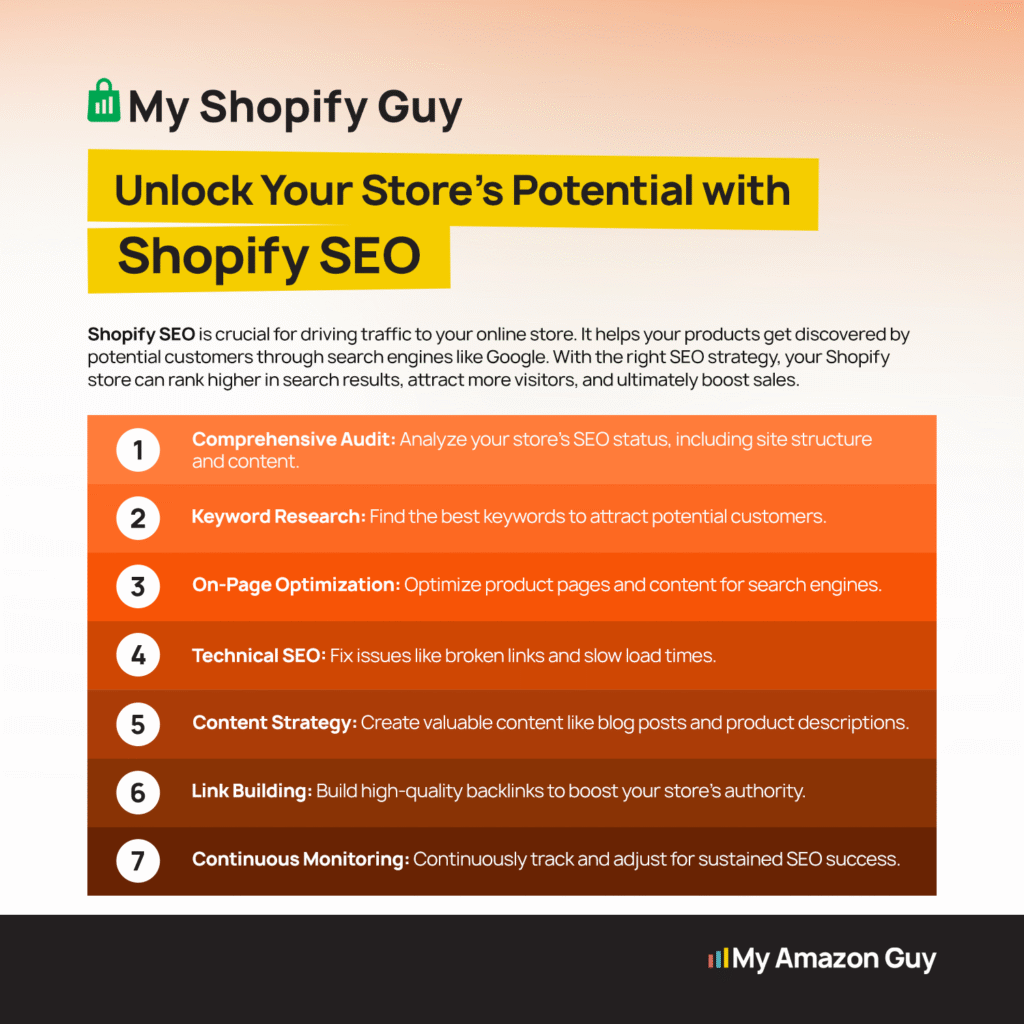Here’s the thing: if you want to get the most out of Shopify for your DTC brand, you need to use the right apps. Shopify’s core features are solid, but apps are what unlock real growth.
Shopify is one of the top platforms for e-commerce sellers, especially Amazon sellers, because of how beginner-friendly it is. You can launch a clean, functional store with zero coding knowledge thanks to its drag-and-drop interface.
But to go beyond “basic”, you’ll need apps that improve how you market, convert, fulfill, and retain customers. These tools help you create a store that performs, not just exists.
This article breaks down the top Shopify apps for DTC brands in 2025 to improve marketing, operations, and customer retention. It also covers common mistakes to avoid and offers expert tips to help Amazon sellers successfully expand into DTC using Shopify.
Table of Contents
Building a DTC Brand Outside Amazon?
We specialize in scaling brands across Shopify and other e-commerce platforms. Let us show you what a real full-channel growth strategy looks like.
What Are Shopify Apps?
Shopify is one of the most widely used e-commerce platforms by DTC and Amazon sellers because it’s easy to use, flexible, and built to scale. One reason it’s so user-friendly is the ability to install Shopify apps that help customize and improve your store’s performance.
Shopify apps are tools you can add to your store to handle specific tasks, like email marketing, upselling, subscriptions, and more. You can find these apps in the Shopify App Store and install them with just a few clicks.
How Do Shopify Apps Help DTC Brands?
When it comes to growing a direct-to-consumer brand, you need tools that do more than just keep the lights on. Here’s how Shopify apps help DTC brands succeed:
- Add missing features that Shopify doesn’t offer out of the box.
- Customize your store layout and customer journey without hiring a developer.
- Connect your Shopify store to platforms like Amazon, TikTok, and more.
- Automate time-consuming tasks like order fulfillment, shipping, and returns.
- Improve the shopping experience with things like faster navigation and better product recommendations.
- Enhance customer service using live chat apps, help desks, and order tracking tools.
- Boost your marketing efforts with tools for email, SMS, social ads, and influencer outreach.
- Increase conversions through upsells, cross-sells, bundles, and abandoned cart recovery.
- Encourage repeat purchases with loyalty programs and personalized offers.
- Scale operations easily by adding or swapping out tools as your business grows.
Must-Have Shopify Apps for DTC Success in 2025
There are tons of apps out there that can help sellers improve how their Shopify store runs, looks, and converts. Below are the best ones we’ve seen work for DTC brands that want to grow fast and sell smarter.
1. GemPages: No-Code Page Builder
Did you know that 75% of consumers judge a brand’s credibility based on how its website looks? But for many sellers, building a sleek and professional site can feel impossible, especially without any web design experience. That’s where apps like GemPages come in.
GemPages is a no-code drag-and-drop builder that lets you design high-converting Shopify pages without touching a single line of code. From homepages to product and landing pages, it gives you full creative control while offering built-in SEO tools, A/B testing, and conversion-focused elements like countdown timers and sticky add-to-cart buttons.
2. Spreadr: Amazon Product Importer for Shopify
If you’re an Amazon seller with an established product catalog but want to expand or shift your business onto Shopify, Spreadr is a must-have app. It lets you import Amazon listings directly into your Shopify store using just a product link with no inventory, shipping, or fulfillment required.
Whether you’re aiming to dropship or earn affiliate commissions, Spreadr helps you monetize your existing Amazon SKUs on Shopify. It syncs product details in real time, supports bulk imports, and gives you flexibility with shopping options like “Add to Cart” or “View on Amazon”.
3. Okendo: Reviews, Surveys, and Loyalty Features
Okendo helps DTC brands build trust by letting customers leave detailed product reviews, star ratings, and even photo or video feedback. It also supports post-purchase surveys and quizzes so you can collect insights and personalize future customer experiences.
What makes Okendo a must-have is that it turns customer feedback into both social proof and a data goldmine. You can even incentivize reviews and referrals with loyalty rewards, helping boost SEO, build credibility, and improve retention all at once.
4. Klaviyo: Email and SMS Marketing
You might think email marketing is outdated, but data says otherwise since it’s still one of the most reliable ways to drive sales. According to the Email Benchmark Report, email delivers an average ROI of $42 for every $1 spent, making it a top-performing channel for e-commerce.
Now, one of the go-to Shopify apps for email and SMS marketing is Klaviyo. It’s built for e-commerce sellers, making it simple to send targeted messages based on what your customers actually do like browsing a product, abandoning a cart, or placing an order.
5. Loop: Returns and Exchanges Made Easy
Loop helps DTC brands automate and optimize returns by giving customers a simple way to request exchanges or refunds without contacting support. Instead of refunding right away, the platform encourages shoppers to exchange, which helps you save the sale and keep the relationship.
For sellers, Loop reduces support tickets, handles label creation, and integrates directly with Shopify to keep everything in sync. It also lets you offer store credit or upsell during the exchange process, turning what used to be a loss into another chance to drive revenue.
6. Gorgias: Customer Support That Drives Loyalty
Gorgias is a customer service app built specifically for e-commerce, and it integrates directly with Shopify to give your support team full access to order data, customer history, and more. You can handle emails, live chat, and SMS all from one dashboard while automating common replies with AI-powered tools.
For DTC brands, Gorgias is about driving retention and even generating sales through smarter conversations. With features like instant refunds, order edits, and product recommendations, support becomes more than a cost center; it becomes a revenue channel.
7. ParcelPanel: Smarter Post-Purchase Tracking
ParcelPanel helps DTC brands level up the post-purchase experience by offering real-time tracking updates and automated shipping notifications. Instead of customers bombarding your support team with “Where’s my order?” emails, they get branded updates every step of the way.
Beyond tracking, ParcelPanel gives you a custom tracking page, return portal, and even shipping protection to build trust after checkout. It’s a simple way to reduce support tickets, retain customers, and turn post-purchase anxiety into post-purchase satisfaction.
8. Wishlist Plus: Reduce Cart Abandonment
40% of shoppers say their experience would be better if they could save items they’re interested in. Wishlist Plus makes that possible by letting customers save products they love, even without an account, which helps reduce cart abandonment and increases return visits.
For DTC brands, this app levels up both customer experience and data strategy. With clear insights into what customers are saving, you can launch back-in-stock alerts, run targeted promos, and push personalized offers that convert.
9. Smart SEO: Easy SEO Wins
Smart SEO is built to help DTC brands boost their visibility on search engines without needing deep technical skills. It handles things like generating meta titles, writing descriptions, tagging images, and even fixing broken links automatically.
For sellers who want more organic traffic and higher rankings, Smart SEO is a practical, no-fluff solution. It improves site speed, adds structured data, and keeps your store clean behind the scenes so customers (and Google) can find you faster.
10. Privy: Email, SMS, and Pop-Up Marketing That Converts
Privy gives DTC brands the tools they need to grow sales using email, SMS, and attention-grabbing pop-ups. From spin-to-win wheels to exit-intent banners, it helps capture leads and bring shoppers back before they bounce.
With built-in automation, you can send welcome emails, abandoned cart reminders, and flash sale alerts without lifting a finger. Plus, Privy integrates seamlessly with Shopify, making it easy to sync your customer data, products, and discount codes for targeted campaigns that actually work.
Need Help Going DTC?
Our team doesn’t just optimize Amazon, we help brands crush it on Shopify, too.
Common Mistakes DTC Brands Make with Shopify Apps
When sellers use Shopify apps, they can also make mistakes that hurt their store’s performance or waste money. Below are the common mistakes they should avoid, and by learning about them, they can better stay on track.
1. Using Apps Without a Clear Strategy
Randomly installing apps without knowing what you’re trying to solve leads to clutter, overlap, and wasted time. Start by identifying your actual business need first, then find an app that fits that goal, not the other way around.
2. Overlapping Features Across Multiple Apps
Having more than one app doing the same job can create technical conflicts and make your backend harder to manage. Regularly review your installed apps and replace overlapping tools with single, more efficient solutions.
3. Ignoring App Permissions and Data Access
Some apps ask for access to sensitive customer data they don’t need, which opens the door to security issues. Before installing, check the app’s permission requests and only trust developers with strong privacy practices.
4. Skipping Shopify’s Built-in Features
Many sellers jump to third-party apps without realizing Shopify already has powerful built-in tools like Shopify Flow and Functions. Before paying for another app, look into what Shopify already offers, since it might already solve your problem for free.
5. Installing Too Many Apps
It only takes a few seconds for visitors to decide whether to stay on your site, so having too many apps that slow down your Shopify store can hurt conversions. Stick to only the apps that directly support your goals and regularly remove anything you’re not actively using.
FAQs About Shopify Apps for DTC Brands
What is DTC on Shopify?
DTC on Shopify means selling products straight to customers without using third-party retailers or marketplaces. Brands use Shopify to manage everything from storefront to fulfillment under one platform.
How many apps should I have on Shopify?
Only install the apps you actually need, which is ideally under 10. Too many apps can slow down your site and create backend issues.
How many products can I have on my Shopify store?
Shopify doesn’t have a strict limit on product count, but performance may be affected if your store has over 50,000 products. Keep your catalog clean and organized for faster load times.
Winning DTC with the Right Shopify Apps
Many Amazon sellers are branching out into DTC to take control of their brand, and Shopify is often the go-to platform for making that move. While there are a few challenges along the way, the right Shopify apps can make it easier to sell, scale, and support your customers.
Good thing there’s no shortage of helpful apps for boosting conversions, automating tasks, and improving the customer journey. Through this guide, we hope it’s now easier for you to choose the right ones without wasting time or money testing dozens of options.
Need help with your DTC site? Contact our full-service Amazon agency that also builds and scales DTC brands with proven marketing solutions.
Let’s Expand Your Brand
We help Amazon sellers make the jump to Shopify and succeed. From store setup to retention strategy, we’ve got your DTC playbook covered.




